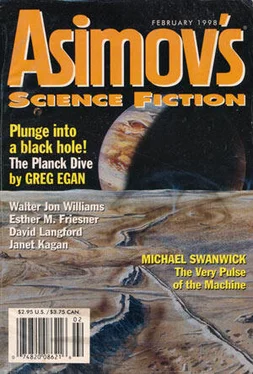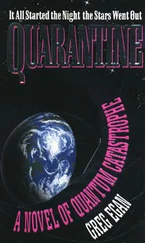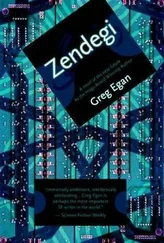Greg Egan - The Planck Dive
Здесь есть возможность читать онлайн «Greg Egan - The Planck Dive» весь текст электронной книги совершенно бесплатно (целиком полную версию без сокращений). В некоторых случаях можно слушать аудио, скачать через торрент в формате fb2 и присутствует краткое содержание. Год выпуска: 1998, Издательство: Dell Magazines, Жанр: Фантастика и фэнтези, на английском языке. Описание произведения, (предисловие) а так же отзывы посетителей доступны на портале библиотеки ЛибКат.
- Название:The Planck Dive
- Автор:
- Издательство:Dell Magazines
- Жанр:
- Год:1998
- ISBN:нет данных
- Рейтинг книги:3 / 5. Голосов: 1
-
Избранное:Добавить в избранное
- Отзывы:
-
Ваша оценка:
- 60
- 1
- 2
- 3
- 4
- 5
The Planck Dive: краткое содержание, описание и аннотация
Предлагаем к чтению аннотацию, описание, краткое содержание или предисловие (зависит от того, что написал сам автор книги «The Planck Dive»). Если вы не нашли необходимую информацию о книге — напишите в комментариях, мы постараемся отыскать её.
“Cocoon” (May 1994); “Luminous” (September 1995); and “Tap” (November 1995), have all made the Hugo award’s final ballot. The paperback edition of Mr. Egan’s near-future novel,
and the hard-cover edition of his far-future novel,
have just been released by HarperPrism.
The Planck Dive — читать онлайн бесплатно полную книгу (весь текст) целиком
Ниже представлен текст книги, разбитый по страницам. Система сохранения места последней прочитанной страницы, позволяет с удобством читать онлайн бесплатно книгу «The Planck Dive», без необходимости каждый раз заново искать на чём Вы остановились. Поставьте закладку, и сможете в любой момент перейти на страницу, на которой закончили чтение.
Интервал:
Закладка:
Then she said, “I can’t stay.”
“ Why not? What is there to stop you? You can’t stay buried in Athena—” Gisela caught herself; whatever bizarre hold the place had on her, disparaging it wouldn’t help.
Prospero was muttering in disbelief now, “Ingratitude! Base ingratitude!” Cordelia regarded him with forlorn affection. “He’s not ready.” She faced Gisela, and spoke plainly. “Athena won’t last forever. Polises like that form and decay; there are too many real possibilities for people to cling to one arbitrary sanctified culture, century after century. But he’s not prepared for the transition; he doesn’t even realize it’s coming. I can’t abandon him to that. He’s going to need someone to help him through.” She smiled suddenly, mischievously. “But I’ve cut two centuries off the waiting time. If nothing else, the trip did that.”
Gisela was speechless for a moment, shamed by the strength of this child’s love. Then she sent Cordelia a stream of tags. “These are references to the best libraries on Earth. You’ll get the real stuff there, not some watered-down version of flesher physics.”
Prospero was shrinking the podium, descending to ground level. “Cordelia! Come to me now. We’re leaving these barbarians to the obscurity they deserve!”
For all that she admired Cordelia’s loyalty, Gisela was still saddened by her choice. She said numbly, “You belong in Cartan. It should have been possible. We should have been able to find a way.”
Cordelia shook her head: no failure, no regrets. “Don’t worry about me. I’ve survived Athena so far; I think I can see it through to the end. Everything you’ve shown me, everything I’ve done here, will help.” She squeezed Gisela’s hand. “Thank you.”
She joined her father. Prospero created a doorway, opening up onto a yellow brick road through the stars. He stepped through, and Cordelia followed him.
Vikram turned away from the gravitational wave trace and asked mildly, “All right, you can own up now: who threw in the additional exabyte?”
“Freeeeee-dom!” Cordelia bounded across Cartan Null’s control scape,
a long platform floating in a tunnel of color-coded Feynman diagrams, streaming through the darkness like the trails of a billion colliding and disintegrating sparks.
Gisela’s first instinct was to corner her and shout in her face: Kill yourself now! End this now! A brief side-branch, cut short before there was time for personality divergence, hardly counted as a real life and a real death. It would be a forgotten dream, nothing more.
That analysis didn’t hold up, though. From the instant she’d become conscious, this Cordelia had been an entirely separate person: the one who’d left Athena forever, the one who’d escaped. Her extended self had invested far too much in this clone to treat it as a mistake and cut its losses. Beyond anything it hoped for itself, the clone knew exactly what its existence meant for the original. To betray that, even if it could never be found out, would be unthinkable.
Tiet said sharply, “You didn’t raise her hopes, did you?”
Gisela thought back over their conversations. “I don’t think so. She must know there’s almost no chance of survival.”
Vikram looked troubled. “I might have put our own case too strongly. She might believe the same discoveries will be enough for her—but I’m not sure they will.”
Timon sighed impatiently. “She’s here. That’s irreversible; there’s no point agonizing about it. All we can do is give her the chance to make what she can of the experience.”
A horrifying thought struck Gisela. “The extra data hasn’t overburdened us, has it? Ruled out access to the full computational domain?” Cordelia had compressed herself down to a far leaner program than the version she’d sent from Earth, but it was still an unexpected load.
Sachio made a sound of indignation. “How badly do you think I did my job? I knew someone would bring in more than they’d promised; I left a hundredfold safety margin. One stowaway changes nothing.”
Timon touched Gisela’s arm. “Look.” Cordelia had finally slowed down enough to start examining her surroundings. The primary beams, the infrastructure for all their computation, had already been blue-shifted to hard gamma rays, and the colliding photons were creating pairs of rela-tivistic electrons and positrons. In addition, a range of experimental beams with shorter wavelengths probed the physics of length scales ten thousand times smaller—physics that would apply to the primary beams about a subjective hour later. Cordelia found the window with the main results from these beams. She turned and called out, “Lots of mesons full of top and bottom quarks ahead, but nothing unexpected!”
“Good!” Gisela felt the knot of guilt and anxiety inside her begin to unwind. Cordelia had chosen the Dive freely, just like the rest of them. The fact that it had been a hard decision for her to make was no reason to assume that she’d regret it.
Timon said, “Well, you were right. I was wrong. She certainly tunneled out of Athena.”
“Yeah. So much for your theory of closed trapped memetic surfaces.” Gisela laughed. “Pity it was just a metaphor, though.”
“Why? I thought you’d be overjoyed that she made it.”
“I am. It’s just a shame that it says nothing at all about our own chances of escape.”
Each orbit gave them thirty minutes of subjective time, while the true length and time scales of Cartan Null shrank a hundredfold. Sachio and Tiet scrutinized the functioning of the polis, checking and rechecking the integrity of the “hardware” as new species of particles entered the pulse trains. Timon reviewed various methods for shunting information into new modes, if the opportunity arose. Gisela struggled to bring Cordelia up to speed, and Vikram, whose main work had been the nanomachines, helped her.
The shortest-wavelength beams were still recapitulating the results of old particle accelerator experiments; the three of them pored over the data together. Gisela summarized as best she could. “Charge and the other quantum numbers generate a kind of angle between world lines in the networks, just like spin does, but in this case they act like angles in fivedimensional space. At low energies what you see are three separate subspaces, for electromagnetism and the weak and strong forces.”
“Why?”
“An accident in the early universe with Higgs bosons. Let me draw a picture…”
There was no time to go into all the subtleties of particle physics, but many of the issues that were crucial outside Chandrasekhar were becoming academic for Cartan Null anyway. Broken symmetries were being restored as they spoke, with increasing kinetic energy diluting differences in rest mass into insignificance. The polis was rapidly mutating into a hybrid of every possible particle type; what governed their future would not be the theory of any one force, but the nature of quantum mechanics itself.
“What lies behind the frequency and wavelength of a particle?” Vikram sketched a snapshot of a wave packet on a spacetime diagram. “In its own reference frame, an electron’s phase rotates at a constant rate: about once every ten-to-the-minus-twenty seconds. If it’s moving, we see that rate slowed down by time dilation, but that’s not the whole picture.” He drew a set of components fanning out at different velocities from a single point on the wave, then marked off successive points where the phase came full circle for each one. The locus of these points formed a set of hyperbolic wavefronts in spacetime, like a stack of conical bowls—packed more tightly, in both time and space, where the components’ velocity was greater. “The spacing of the original wave is only reproduced by components with just the right velocity; they trace out identical copies of the wave at later times, all neatly superimposed. Components with the wrong velocity scramble the phase, so their copies all cancel out.” He repeated the entire construction for a hundred points along the wave, and it propagated neatly into the future. “In curved spacetime, the whole process becomes distorted—but given the right symmetries, the shape of the wave can be preserved while the wavelength shrinks and the frequency rises.” Vikram warped the diagram to demonstrate. “Our own situation.”
Читать дальшеИнтервал:
Закладка:
Похожие книги на «The Planck Dive»
Представляем Вашему вниманию похожие книги на «The Planck Dive» списком для выбора. Мы отобрали схожую по названию и смыслу литературу в надежде предоставить читателям больше вариантов отыскать новые, интересные, ещё непрочитанные произведения.
Обсуждение, отзывы о книге «The Planck Dive» и просто собственные мнения читателей. Оставьте ваши комментарии, напишите, что Вы думаете о произведении, его смысле или главных героях. Укажите что конкретно понравилось, а что нет, и почему Вы так считаете.










